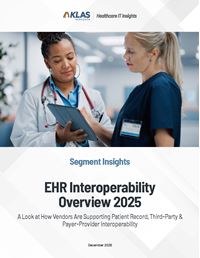 2026 BEST IN KLAS
2026 BEST IN KLAS
Preferences
Related Series


Interoperability 2015
Are We Lifting Together?
Interoperability is like moving a piano. It is a team effort, but when the piano tumbles down the stairs, puts a hole in the wall, or lands on a foot, it is always someone else’s fault. The truth is that pointing fingers does not help—we all fail or succeed together. Vendors and providers both point to standards as the main barrier to success. Really, how much of the barrier disappears with intense cooperation? Who is stepping in to lift the industry? Who could carry more? Where can we work together better?
1. WHICH CONNECTIONS BRING HIGH VALUE?
Providers want invisible, effortless connections that provide high patientcare value. Connections via EMR vendors’ private networks are the closest match today, with Epic clients in the Care Everywhere network composing 80%+ of such connections and enjoying immediate benefits once live. Demonstrating the success of clear governance and standards, Care Everywhere is successful due to clear client governance, Epic’s large footprint, and an almost effortless activation process. Epic’s network does not solve the critical need for heterogeneous connections built through vendor collaboration. In the absence of such collaboration, many are hopeful that Direct messaging will provide a valuable plug-and-play connection between vendors. To date, most are disappointed with poor coordination among vendors, difficulty locating records, and limited parsing abilities. A majority of respondents have little optimism about the future of public HIEs, reporting limited value.
VALUE VS. SETUP COMPLEXITY
2. ATHENAHEALTH EASIEST TO CONNECT TO, FOLLOWED BY CERNER AND EPIC
Who do customers, non-customers, and vendors say is easiest/most effective to connect to? It depends on who you ask. Customers rating their own vendors tag athenahealth and Epic as easiest to connect to. Vendor peers list Epic as most effective to connect to and MEDITECH as least effective, followed by Cerner. Providers connecting with foreign EMRs pick athenahealth and Cerner as leaders in connection ease.
EASIEST/HARDEST VS. CUSTOMER SATISFACTION
ATHENAHEALTH: athenahealth delivers both simple and very complex connections, choosing not to pass along many additional integration costs to customers. They are also a leader in bringing outside patient data into the clinician workflow in a convenient format. Non-athena customers report that athena’s SaaS environment is easy to connect to, as they can connect to multiple practices with one interface.
EPIC: Data sharing among Epic clients is pervasive across the country, and sharing is solid via pointto- point and HIE connections to organizations with foreign EMRs. Epic customers share with other Epic customers in order to receive the same, often forcing competitive health systems to share whether they want to or not. Once Epic agrees to an integration project, their strong service is a significant benefit. Some non-customers voice frustration with Epic’s strict adherence to self-imposed standards.
CERNER: Cerner and non-Cerner customers report Cerner to be easy to connect to and effective at a broad range of complex connections. Cerner is rated lower by clients for higher integration costs and the lack of a simple switch to turn on sharing with other Cerner clients. Reports from vendor peers of Cerner being less effective to work with are tied to software versions, costs, and licensing outside the CommonWell conversation.
3. ANY REALITY TO INFORMATION BLOCKING?
How willing are VENDORS to share?
Information blocking is willingly refusing to share data. Providers overwhelmingly report their vendors to be willing to help them share but say business revenue models and lack of technical resources often get in the way. McKesson’s, eClinicalWorks’, and Allscripts’ dedicated interoperability/HIE offerings have some reporting frustration that their interoperability requires a license and connection fees to the HIE offering. No provider has reported a circumstance in which a vendor contractually or otherwise willingly impeded information sharing, aside from the business models around profitability. Most vendors have changed or are changing these models to more cost-effective approaches (e.g., CommonWell clients report minimal cost barriers and Epic eliminated a per-transaction fee).
How willing are PROVIDERS to share?
98% of providers mention that they are willing to share, but only 82% report their main competitor to be similarly willing. Either way, most providers are starting to see data sharing as inevitable, but resistance remains. Smaller ambulatory practices are the least likely care providers to want to share their own records.
PROVIDER WILLINGNESS TO SHARE CLINICAL INFORMATION
ADDITIONAL TAKEAWAYS
1. IS TODAY'S INTEROPERABILITY SUCCESS TIED TO SERVICE?
athenahealth and Epic lead with their overall service levels, while eClinicalWorks, McKesson, GE, and NextGen are described as interoperability laggards, receiving low marks in general support. Why the correlation? No vendor brings a technology silver bullet to the fight, but attentive vendors focused on client success are recognized for their support.
2. PERCEPTION IS NOT REALITY?
Beyond their current experiences with interoperability, providers were asked about their general perceptions of which vendors struggle the most. The result? In one instance, perceptions are not in line with actual experiences. 44% of providers with no or very limited Epic experience report a perception that Epic struggles the most. Contrary to this perception, Epic customers, providers connecting into Epic, and even other vendors give Epic high marks for interoperability strengths.
3. WHERE SHARING BREAKS DOWN
Smaller ambulatory and single-physician practices report the highest frustration with interoperability and the lowest willingness to share their own data, due to perceived risks. With limited resources, costs are often a barrier to effectively connecting with surrounding providers. Ambulatory-focused vendors receive some of the lowest marks from their customers, for inconsistent performance, untenable costs, and unacceptable turnaround times. eClinicalWorks is highlighted as one of the most challenging vendors to connect to, yet participants report more point-to-point connections with eClinicalWorks than with any other vendor.
4. FHIR IS HOT/CAREQUALITY AND COMMONWELL ARE NOT:
With competing standards and collaborations, providers watch for what will make the most difference. Direct connections are often difficult to set up and seemingly of limited value, yet many are optimistic that Direct sharing will soon improve. FHIR was voted by providers and vendors as the standard that will be of highest future value, while prominent collaborations CommonWell and The Sequoia Project (also known as Carequality or Healtheway) are considered by providers as significantly less likely to improve future interoperability.
5. REAL DIFFERENCES IN COST
Healthcare leaders reported their costs for recent connections, and though the costs were difficult to normalize and compare in detail, real differences were confirmed across the industry. Providers point to McKesson and Allscripts as requiring more investment in dedicated interoperability platforms (RelayHealth and dbMotion) and requiring licensing and individual connection fees. athenahealth stands out as generally requiring no added costs for interoperability, a reflection of the different business models in the industry.
6. DOES INTEROPERABILITY IMPACT EMR BUYING DECISIONS TODAY?
The answer is no. As KLAS closely monitors EMR buying trends, we have yet to see EMR decisions hinging on which vendor is better at externally sharing health information data. Healthcare organizations are unclear about vendor differences when it comes to external connectivity and so cannot use this as a decision criteria.

Project Manager
Robert Ellis
This material is copyrighted. Any organization gaining unauthorized access to this report will be liable to compensate KLAS for the full retail price. Please see the KLAS DATA USE POLICY for information regarding use of this report. © 2026 KLAS Research, LLC. All Rights Reserved. NOTE: Performance scores may change significantly when including newly interviewed provider organizations, especially when added to a smaller sample size like in emerging markets with a small number of live clients. The findings presented are not meant to be conclusive data for an entire client base.









.jpg?preset=report-cover-two-page-report)





